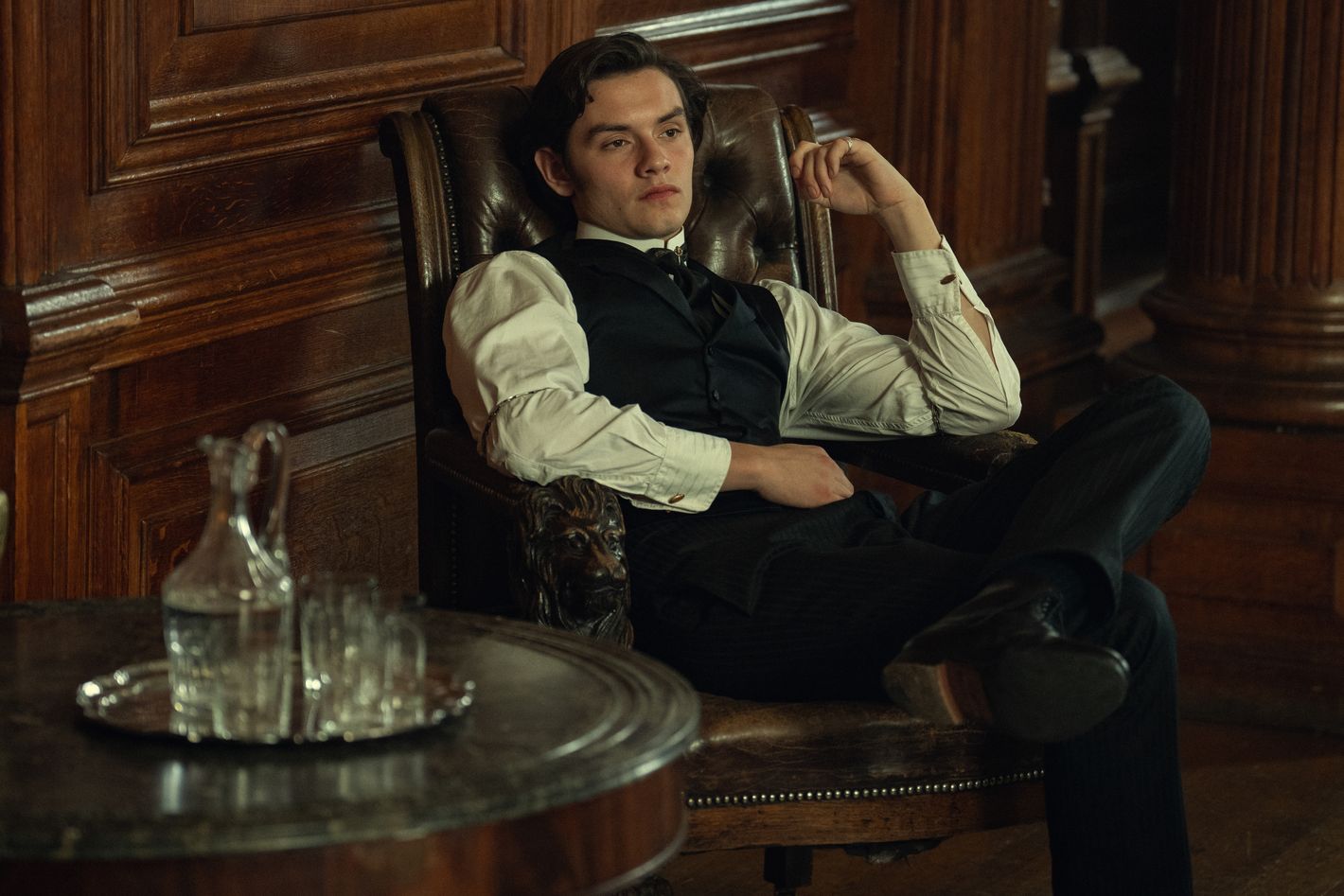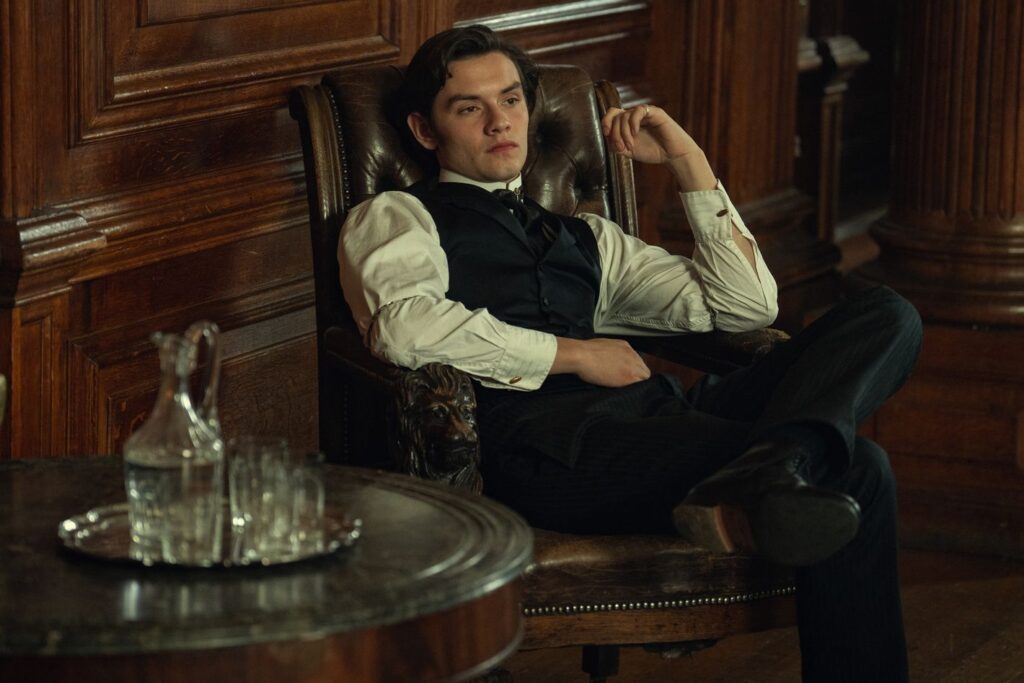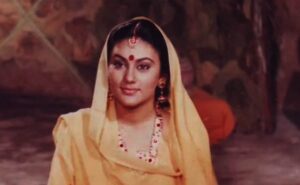
It’s May 27, 1868, the day of Benjamin Guinness’s funeral. Anyone expecting a quiet time of mourning and reflection is sure to be surprised. The son of Arthur Guinness II and grandson of Arthur Guinness, founder of the famed brewery located at Dublin’s St. James Gate, Benjamin became the wealthiest man in Ireland after assuming control of the company upon his father’s death. He also served as Lord Mayor of Dublin and restored St. Patrick’s Cathedral at his own expense. But, as the first episode of House of Guinness, a Steven Knight-created miniseries inspired by the Guinness family, opens, it looks like poor Benjamin might not even make it to the grave in one piece.
Not one mob but two awaits him as his casket rolls out of the factory gates. On one side are evangelistic followers of the Temperance movement, whose objections to the Guinness family don’t really need to be explained. On the other hand, there’s the Fenians, the unruliest of the factions pushing for Irish independence from Great Britain. Sure, Benjamin Guinness might have made great beer, but he was also a unionist and a Protestant. As a Fenian rabble rouser, we’ll later learn, is named Patrick Cochrane (Seamus O’Hara), puts it, there will be no peaceful burial when “it’s his machine of the Protestant gentry that makes us Irish suffer at the hands of the British.” Fortunately, Sean Rafferty (James Norton), soon to be revealed as a kind of all-purpose fixer for the Guinness family (among other duties), has a solution, albeit a crude one. If Guinness’s workers want to see him buried, and they do, they’ll need to grab a “means of persuasion” and take to the streets.
How much of this is based in fact? Well, it’s probably best to take the series-opening disclaimer seriously: “This Fiction is Inspired by True Stories.” The Freeman’s Journal, a Dublin newspaper whose sympathies tilted toward the nationalist rather than the unionist cause, described Guinness as “an eminent citizen and much lamented gentleman” whose funeral was “attended by every mark of respect, shown by men of every rank and station of every shade of political and religious belief.” But that’s not the stuff of compelling drama, right? And it’s not as if newspapers always get every detail right, or that the Guinness story doesn’t overlap with all the hot-button political issues roiling Ireland at the time and in the years that followed. The disclaimer makes clear this will be a “print the legend” (and sometimes an “invent the legend”) endeavor. It might be best just to go with it.
While the streets threaten to erupt into violence, Benjamin’s children share a quiet, if not entirely solemn, moment together as they get ready for their father’s funeral. While Edward (Louis Partridge) struggles to tie his tie to his liking, he snipes at his older brother Arthur (Anthony Boyle) about the champagne of London washing the Irish off his tongue. They’re soon joined by Anne (Emily Fairn), who solves Edward’s tie problems but doesn’t do much to make the situation less prickly, listening without disagreement as Arthur assumes that any tears shed at the funeral by those outside the family will be of the crocodile variety with the ulterior motive of winning favor. Meanwhile, Benjamin (Fionn O’Shea), the youngest of the three Guinness brothers, continues to sleep off whatever he drank the night before (or perhaps even more recently). They don’t look or act much like four of the most powerful people in Ireland, but family relations can be strange.
None of this seems to bother John Potter (Michael McElhatton), a longtime servant of the Guinness family, who arrives with the news that the funeral might be delayed because of “the vast extent of the crowd of well-wishers.” He’s not fooling anyone, nor does he attempt to, but he does lay out the particulars about the Fenians and the Evangelists. Anne’s sure that Rafferty will handle it, a remark that inspires to make an allusion to Rafferty sparking fires in the hearts of others. He knows, or at least suspects, that Anne’s admiration extends beyond Rafferty’s ability to handle trouble.
Shortly before waking up Benjamin, the siblings vow to put on a united front. This doesn’t last very long. Benjamin, it turns out, doesn’t want to be woken up, particularly by way of a cold glass of water. Anne only half mockingly suggests that Benjamin and Arthur settle their differences with a duel (or maybe it’s not a joke). “Today of all days, we must leave like a civilized Christian family,” Anne insists before adding that they are just that, “In our way.” Still, she’s able to rally them for some hand-holding and a short prayer. Maybe this will work out after all.
After a bit of bottle throwing and street violence, Rafferty assures that Benjamin’s body makes it to the church intact, if not quite on time. Specifically, they arrive at St. Patrick’s Cathedral, a place close to Benjamin’s heart, where he’s remembered for his benevolence toward his workers (whom he forbade from discussing religion and politics), political career, and devotion to his family.
It’s all very polite and proper. Meanwhile, in the streets, the Fenians try to figure out how best to take advantage of the power vacuum. Roughed up in the scuffle, Patrick wants to burn Guinness in the most literal fashion by setting fire to all the empty bottles in the Guinness cooperage. His sister Ellen (Niamh McCormack), a leader of the Irish Republican Brotherhood’s Ladies Committee, prefers to take a more surgical tactic, in no small part because a Dublin deprived of beer will not be the least bit sympathetic to those responsible for the deprivation. “Think,” Ellen advises. Benjamin Guinness might have been, in her words, “flawless,” but his children are another story. They have secrets the Fenians can exploit. What’s more, they’re not very careful with those secrets, and Ellen knows maids who’ve overheard a lot of loose talk. With the right leverage, she can bend the Guinness family to her will.
Ellen certainly has a point about the younger generation’s lack of discretion. When Anne, who’s married to an older clergyman/baron named William Plunket (Tim Creed), meets Rafferty in a dark alley to give him money for the security detail he organized, she brings Potter with her. He may not be able to overhear their conversation concerning Anne’s regrets about going “beyond all limits” with Rafferty (he serves the family in many different ways), but it’s clear he knows something is up. Also, about those regrets: Anne doesn’t seem to feel them too deeply, based on the way she lets Rafferty get close to her and talk about cats mating in the street.
Though Benjamin remains absent, Anne returns to the funeral reception just in time to miss the appearance of Aunt Agnes (Dervia Kirwan), who needles Arthur about assuming Benjamin’s seat in Parliament then gets the brush-off from Edward, who tells her that if she hasn’t been invited to the reading of Benjamin’s will that’s because she has not been remembered in the will. She offers a reply rooted in Irish folklore: “When the will is read out, I hope we will discover that your father knew his children well enough to know which of you is Ogma and which of you is Dagda.” As if confirming Edward’s accusation that he’s lost sight of his Irish roots, Arthur needs this explained to him. They’re mythological brothers, one trustworthy, the other not.
Who’s who in this family remains an open question, but the reference leads Edward to fill Arthur in on what he’s missed during his time in London. Edward has been working in the brewery. What’s more, he really likes working in the brewery. That Arthur, as the eldest, will inherit the brewery seems a bit inappropriate. So they come to a handshake agreement: Edward offers to buy the brewery from Arthur in return for 35 percent of the profits. That will free Arthur to serve in Parliament and utilize that position to the family’s advantage. It sounds reasonable, especially since, as Arthur puts it, “our love is our bond.” So why does it seem like this could all easily go sideways?
The brothers aren’t done with family business, however. Their uncle, the Reverend Henry Grattan Guinness (Michael Colgan), would like a word with them. Henry does not approve of the decision to have music and dancing after the funeral. In fact, he doesn’t approve of much of anything. But he would like some assurances that the brothers will continue to support his Harley College and its missionary program. The brothers don’t seem sympathetic, but Anne swoops into the meeting to make it clear that she does want to be hands-on with Guinness’s philanthropic efforts.
As this unfolds, Benjamin navigates a different kind of drama. The sympathetic Lady Christine (Jessica Reynolds) has brought him a pistol but, fearing he plans to take his own life, has made sure it was not loaded. She’s a bit off, however. Benjamin owes a lot of money to a “bad man” named Bonnie Champion (David Wilmot), who technically works for the family but also runs some “sidelines,” like a gambling operation. It’s his love of gambling that’s tripped Benjamin up, leading him to owe the kingly sum of £170, a debt steep enough in the 1860s that he fears he’ll end up at the bottom of Dublin Harbor. Christine has a solution: she’ll marry him and pay his debts, on the condition that “the madness stops.” She specifically means his drinking, but she could, and perhaps should, be thinking beyond that. Benjamin is when he replies, “I am the madness.” (This does not go over well.)
Speaking of Bonnie Champion, Ellen would like a word with him. This leads her to the docks, where a gatekeeper makes the mistake of thinking she’s come to audition for a spot in one of Bonnie’s houses of ill repute. (It’s not one he’ll make twice.) Bonnie, on the other hand, does know who Ellen is and is a bit wary about what she might want from him. But her offer turns out to be pretty appealing: In exchange for Guinness family secrets, his organization will get a one-year break from paying its 10 percent tax to the Fenian Brotherhood. Bonnie’s quick to spill, too. Not only does Benjamin owe him a small fortune, but he also takes betting tips from fairies, spirits, and other voices in his head. So why hasn’t he had Benjamin killed? Bonnie might be a scary man, but he’s worried about an even scarier man: Rafferty. Before Bonnie takes off, however, Ellen lets him know that it’s good to know Benjamin’s secrets, but it’s Arthur’s secrets she really wants to learn.
As Ellen makes good on her plan, so does her brother. A squad of Fenians set fire to the cooperage’s barrels, ending the day of Benjamin Guinness’s funeral in spectacular, fiery fashion. Rafferty leads the efforts to put out the fire, working side-by-side with Bonnie, who drops a hint about seeing a “wharfinger secretary who’s lost her way, and lost her mind” just as Rafferty spies Ellen in the distance behind the smoke.
As the episode draws to a close, Christine takes a drunken Benjamin away as Arthur and Edward turn reflective. Especially Arthur. “As of tomorrow morning, everything becomes real,” he says, “brewing, politics.” He also seems a little down about the very idea of love, for reasons he does not explain. Edward, by contrast, is full of plans about bringing Guinness to America. When Anne joins them, she offers Arthur a shoulder to cry on. “Tomorrow will be a big day,” he says as he seems to drift off to sleep. Outside, the rain douses the flames at the cooperage, but the situation still seems a bit explosive.
This first episode asks viewers to keep track of a lot of information, introducing new characters with seemingly every scene, while also establishing the cultural and political situation of 1868 Dublin. Fortunately, House of Guinness intertwines the two tasks, rolling out new players in the series’ family drama in ways that also reveal details of the setting. The episode brings us from Dublin’s lows — it doesn’t get much lower than a gatekeeper demanding sexual favors for the chance to try out for a brothel — to the rarefied spaces where the wealthy and privileged mourn the loss of one of their own.
It’s a lot, and neither Knight’s script nor Tom Shankland’s direction has a lot of concern with subtlety. But it works, setting up a number of intriguing themes and compelling storylines. Edward and Arthur clearly want different things out of life, but fate has entwined them. Both Anne and Ellen, despite their differences, chafe at the roles women are prescribed to fill. Benjamin … well, he’s kind of a mess, but the sort of mess who seems likely to keep the narrative intriguing as future episodes explore the parts of Guinness’s story you won’t find in the history books (with, it appears, some blanks filled in using some tremendously creative flourishes).
Sláinte!
• House of Guinness does not limit its soundtrack to the era in which it’s set, but it does limit selections to acts from Ireland and the Irish Diaspora. Songs in this first episode include “Starburster,” a track from the Dublin band Fontaines D.C.’s excellent 2024 album Romance. Next up is “Get Your Brits Out,” a typically provocative track from the Belfast hip-hop group Kneecap, who often rhyme in Irish and who’ve been in the news this year and starred in their own biopic, Kneecap, last year. Flogging Molly’s “Devil’s Dance Floor” plays as the cooperage burns. Kneecap’s “H.O.O.D.” plays over the credits.
• Anne’s take on Ogma and Dagda (or “Oghma” and “The Daghda”) seems a bit like an oversimplification of those beings’ characters, but Irish mythology is both complex and sometimes contradictory, and she may have had a particular story in mind. (It’s an oral tradition chiefly preserved by medieval Christians who sometimes tried to align it with their religion.) Dagda’s the chief of the Tuatha Dé Danann, a pantheon of supernatural beings. He’s brother to Ogma, who’s credited with creating the medieval alphabet Ogham. Related, the Fenians take their name from the mythological hero Finn.
• Another newspaper story from the day of Benjamin Guinness’s funeral: Michael Barrett was hanged in London. Barrett was the only man convicted in the Clerkenwell explosion of 1867, which killed 12 bystanders.
It’s a new era for the Guinness family, and sibling has a different idea of what that means.

































































